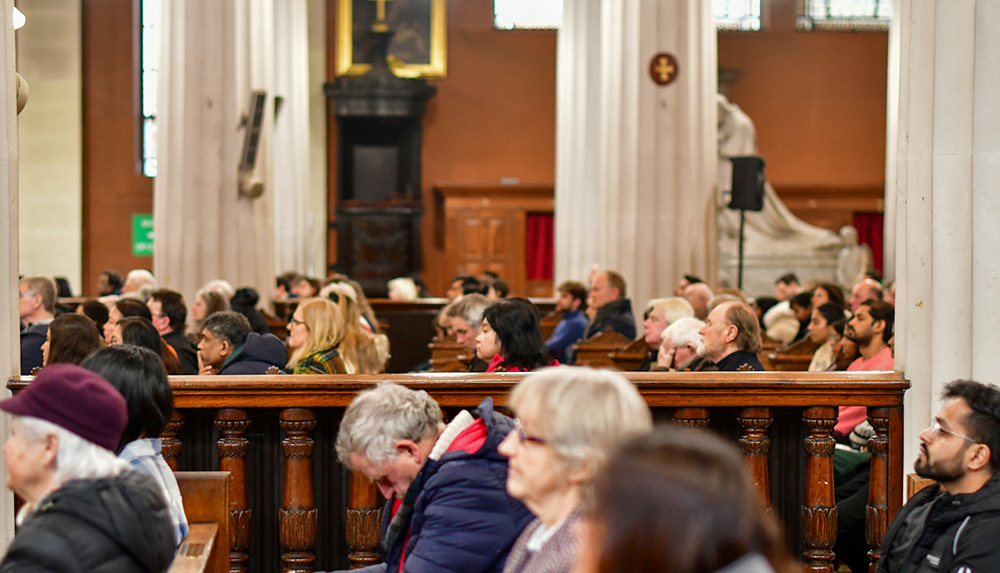God Sideways
Paul Gregory Alms on How Jesus Comes Amid Distractions
The gospel of Jesus Christ came to me wrapped up in my father’s aftershave, Bach preludes, and clip-on ties. I glimpsed the God of the Scriptures while wedged in the pew next to my older sister and my father. My memories of church are not those of fine theological distinctions, or the inspirational rhetoric of the sermon or the beautiful rhythm of the church year. Rather, I remember the feeling I got walking into church and hearing the pipe organ play that otherworldly music. I did not know that I was hearing Bach preludes; I just knew that church sounded like that. The gospel smelled a certain way to me, like my father’s aftershave and his musty suits marinated in cigarette smoke; it smelled like the closed-in, stained-glass smell of the sanctuary.
Jesus came to me in the scratchy uncomfortable clothes I had to wear, in the way my mother would wipe her extra hand lotion all over my face, and the cold car rides early in the morning. None of this seemingly has anything to do with the gospel, with the Scriptures, with the truth, with salvation or Jesus. But it is the way Christ made himself known to me, the skin he put on.
Like Fragments of Glass
It is easy to forget all of this now as a pastor. As a pastor with years of theological education and years of liturgical and sermonic experience, it is easy to forget what church is like in the pew. But every now and again, I am reminded. Occasionally I get the opportunity to sit with “the people,” and it is a startling experience.
What is startling is how much is going on that one never notices from the front when one is completely occupied being the celebrant. Down in the pew, the church service is a much more “multimedia” experience. So much competes (talking, whispering, shifting of seats, rustling of bulletins, children, the backs of others’ heads, digging through purses, and so on) with the “real stuff” going on up front.
Worship is often experienced like fragments of broken glass. If the sensory inputs from outside oneself are not enough to fracture the service, one’s own wandering inner concentration and thoughts will finish the job. One may be able to give attention to verse one of a hymn but verses two and three are swallowed by noticing the Jones lady and her new haircut and who is that new person sitting just over from her, and by the time you get back to the service, half of the confession of sins is done.
You catch a sentence or two of a prayer and then the new green banner jumps out at you and the green reminds you that you need to fertilize your lawn, and then you pop back into the service for the last half of the collect of the day which mentions something about the frailty of our nature which makes you remember the medical test you have scheduled for next week which causes the small balled-up mass of vague anxiety in your belly to open up into a full blossom of fear and now you really are ready to pray, but the prayer has come and gone and the first lesson is almost over.
So it goes through the service.
Discouraging Contrast
The fact that worship is often like this can be discouraging for clergy. As the presiding minister, one is in a liturgical bubble, a space of supreme concentration. The service proceeds exactly, texts are carefully read, rituals enacted, theological and pastoral messages are proclaimed.
That proclamation was prepared with much work and thought. Prayers and chants are precisely intoned. There is so much to notice in the ebb and flow of the service, in the intricate connections between text and church year and hymn and current life in the parish and sermon themes. As pastor, one can easily and rightly get caught up in and consumed with the meaning and beauty of it all.
But spend a service or two out among the congregation and so much of it seems lost upon the philistine mob that occupies the sanctuary. How can the liturgy or the gospel or the Scriptures do their work when attention spans are so sporadic, when a large group of people with all their thoughts and noises and shuffling make concentration nearly impossible?
Dressed in Incidentals
Which brings me back to my father’s aftershave, the Bach preludes, and my scratchy church clothes. All of these items are incidental to the gospel. They did not convey the divine word to me, a sinner. They are completely beside the point. But they are how I experienced the gospel. Squeezed into those stiff Lutheran pews, Jesus got mixed in with all the busyness and extra stuff and sensory data that had nothing to do with why we were there. Jesus came dressed in incidentals.
The gospel never comes to us naked. God did not descend invisibly; he took flesh and dwelt among us. God did not send out bare information; he sent apostles, sinful, messy human beings who lived and spoke to other messy human beings in a particular historical era with particular ways of communicating and speaking and traveling and so on.
The good news of Jesus Christ is never abstract. It is not like digital data we download. It comes with skin, it comes in minutes and hours we experience concretely. It comes dressed in things that do not seem to matter. But these indifferent things can become significant, moments associated with and attached to the presence of Christ.
Incidentals turn out to be not so incidental. I attended a Lutheran parochial school for all eight years of elementary school. For two of those I had extra catechetical training, learning the Small Catechism of Martin Luther by heart and all the important Lutheran doctrines. Yet I cannot recall those two years I spent with my pastor in the classroom. I cannot recall much of any of my religious training in grade school, no specific doctrines or insights. No doubt this has more to do with my own lack of application than with the quality of the instruction, but I do recall one experience rather clearly, something incidental.
On a windy weekday in eighth grade I was excused from school to be a crucifer at a funeral. I remember the cold day, standing next to the pastor, the wind whipping our albs. I can see the serious calm with which he conducted the rites, the way he held himself, how he attended to that family. Out there far from any written texts, far from a classroom or anything addressed to me personally at all, there in the cemetery, I learned the Creed. I learned that God created us and our bodies, that he redeemed them and would one day resurrect them. But I learned it sideways. I learned it by the look on my pastor’s face, the way he stood tall in the cold and wind, the dignified yet caring way he spoke the words of that rite, all for the sake of that family and for a witness to Christ and his resurrection.
Untidy Way Stations
This kind of thing happens in the church pews. The experience is messy and fractured and hardly resembles tidy liturgical manuals, much less our sturdy, orderly volumes of systematics. Yet people get God there in those pews. They get Jesus.
Often they get him sideways, in peripherals. They may not be able to tell you the sequence of the church year, but they can feel when it is Advent or Easter. They may not be able to explain the doctrine of the Incarnation or the vicarious atonement, but they know the taste of that unleavened bread, “his true body” and they know it is Christ substantially and concretely with them. They know that the absolution in its cross-shaped delivery is, for all its repetition and familiarity, God’s voice. The Bible stories somehow become their stories. Even in its fitful and splintered reality, the service manages to communicate that, once again, God has come to me, that for one more week I, in all my weakness and failure, am covered.
Peripherals, getting God sideways, is a consequence of worshipping God in a human body, in and through our sensory perceptions. It is not an argument to abandon teaching or catechesis or meaningful, careful worship. Peripherals cannot communicate without a center. One cannot get God sideways without the actual message and teaching of Christ and his work in all its wonderful, gospel detail.
But most of the people in our churches are not theology students, and our parishes are not miniature seminaries. Perfect, doctrinal, liturgical, and sacramental transmission of the truth never occurs. Our churches are untidy, imperfect way stations where God in his mercy deigns to be heard and felt and to give his mercy and forgiveness and indeed his very self. But he does all this through human beings, through imperfect rituals and words and buildings and gatherings. Yet in all of those distractions, in and through those cracked, humble vessels, God comes to us.
Proclaimed & Present
Getting God sideways is how the church works. The straight-ahead message of the gospel slips out of the preacher’s mouth in his idiosyncratic style and travels through the static of the group, through a thousand competing thoughts and sounds, and is received by a listener who understands it in his own limited way, and yet Christ is proclaimed. Christ has given himself over to sinners, not only to be crucified but also to be shared. In the flawed assembly, Christ is present. Sideways, hidden, but present, God among his people.
Paul Gregory Alms (paulgregoryalms.blogspot.com) is pastor of Redeemer Lutheran Church (LCMS) in Catawba, North Carolina. He is a graduate of Concordia Theological Seminary in Fort Wayne, Indiana, with both MDiv and STM degrees. He has written extensively for journals such as First Things, Concordia Theological Journal, Lutheran Witness, Lutheran Forum, The Cresset, and others. He is married and the father of four girls.
subscription options
Order
Print/Online Subscription

Get six issues (one year) of Touchstone PLUS full online access including pdf downloads for only $39.95. That's only $3.34 per month!
Order
Online Only
Subscription

Get a one-year full-access subscription to the Touchstone online archives for only $19.95. That's only $1.66 per month!
bulk subscriptions
Order Touchstone subscriptions in bulk and save $10 per sub! Each subscription includes 6 issues of Touchstone plus full online access to touchstonemag.com—including archives, videos, and pdf downloads of recent issues for only $29.95 each! Great for churches or study groups.
Transactions will be processed on a secure server.
more from the online archives
calling all readers
Please Donate
"There are magazines worth reading but few worth saving . . . Touchstone is just such a magazine."
—Alice von Hildebrand
"Here we do not concede one square millimeter of territory to falsehood, folly, contemporary sentimentality, or fashion. We speak the truth, and let God be our judge. . . . Touchstone is the one committedly Christian conservative journal."
—Anthony Esolen, Touchstone senior editor










